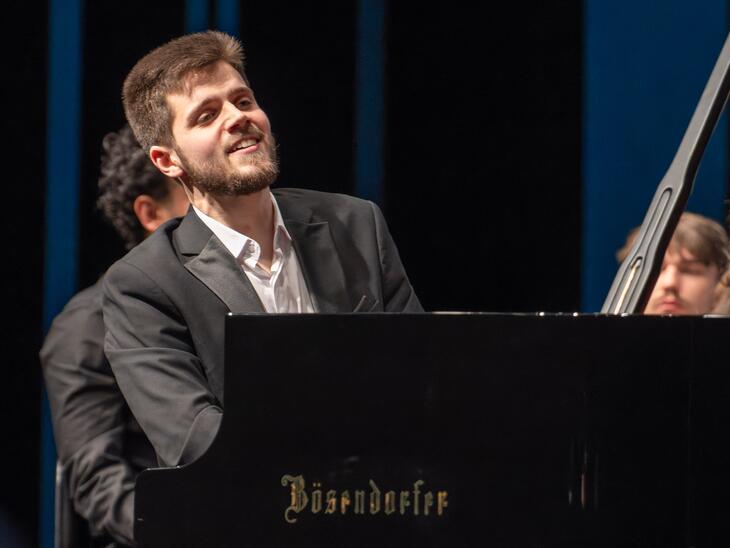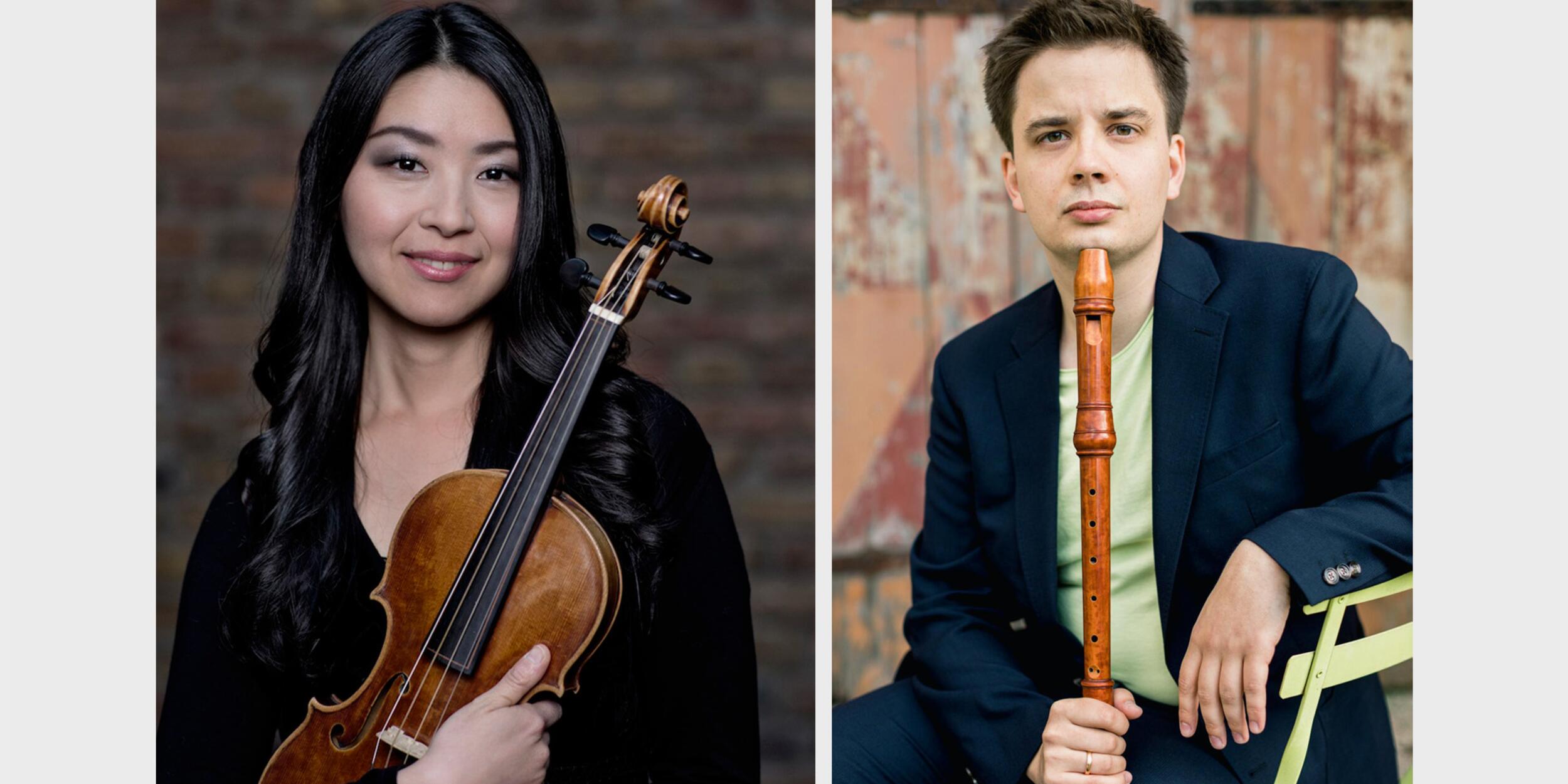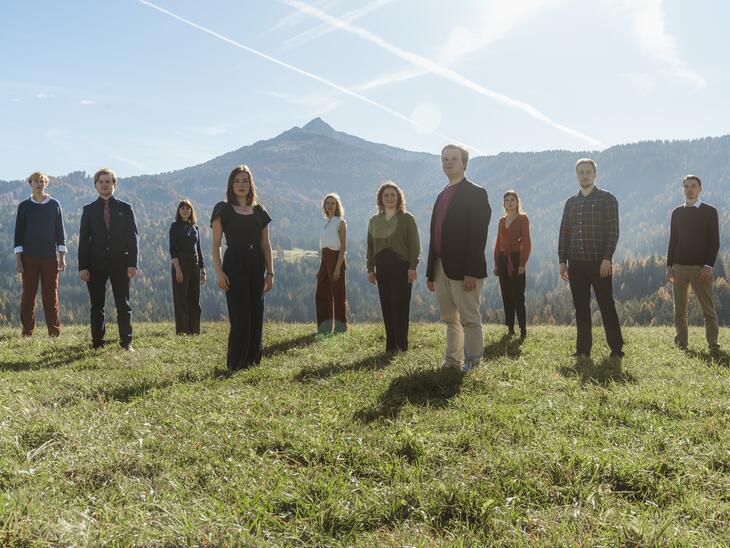The OPUS KLASSIK is the most important German music prize for artists and productions in classical music, awarded by the Verein zur Förderung der Klassischen Musik e.V. Mayumi Hirasaki, professor of baroque violin at the Mozarteum University and concertmaster with Concerto Köln since 2011, was honored in the category "Concert Recording of the Year" for her CD "Pi - Pisendel", which was released by the Berlin Classic label. Max Volbers, recorder player, harpsichordist and senior lecturer at the Mozarteum University, was awarded in the category "Young Artist of the Year" for his CD "Whispers of Tradition" (Genuin label).
Above all: Congratulations on the OPUS KLASSIK! What does the award mean to you?
Mayumi Hirasaki: Thank you very much! For me, the prize means recognition in several ways: firstly, the renewed attention for Pisendel's music and also his work as concertmaster of the Dresden Orchestra.
of the Dresden orchestra. And then it's also an honor for my long collaboration with Concerto Köln and, of course, as a soloist!
Max Volbers: Prizes are a wonderful acknowledgement of what you do. I also think it's good and important that classical music, which is not normally broadcast in prime time, was so present in the two-hour award ceremony program in the main evening program. We are not athletes who can be measured by how fast they have run. Artistic achievements are difficult to compare, which is why there's always a little bit of luck involved in jury awards like this. All the better that it worked out! And of course I'm also really happy for my instrument, which is still often associated with the cliché of being an entry-level instrument.
Are prizes at this level particularly important for younger musicians?
Volbers: Prizes are of course motivating, but at the same time they shouldn't be the main artistic goal you pursue, otherwise you're on the wrong track. Maybe it sounds strange coming from me, because I myself am still at the very beginning myself, but in music studies we sometimes have to be careful that students don't lose focus on what's important because of prizes and competitions with a strong media presence, but above all because of social media. At the beginning of your studies, you shouldn't concentrate on
on building up fan pages in social media. You have to get good at full steam ahead before you start your career - so that you are even up to the demands of such a career. To put it bluntly: as a university, we are the place to become good, not so much to become famous. Nevertheless, we have to prepare students for "the world out there", and that involves so much more than just playing your instrument well. That's why it's so valuable that we have a great Career Center!
You both work in the Department of Early Music. How current is early music in the classical field?
Hirasaki: I think that historical performance practice has long since found its place in the classical music scene. We are currently at a point where it is worthwhile not to rest on the laurels of our predecessors, but to continue researching intensively without compromise and to deepen our findings in our work. and deepen our findings in our work.
Volbers: The basic idea behind the early music movement is not actually to cook your own soup in isolation, but to create a long-term environment in which the focus is on gaining knowledge, new ideas and shaking off conventions. And that this way of understanding and performing music radiates into other areas of the repertoire - which is exactly what is happening: The big baroque orchestras now playWagner and Schumann and many "modern" orchestras play Bach with baroque bows, of course. Being able to make early music at the Mozarteum is wonderful: we have become one of the world's leading locations in a very short time, have a great faculty and internationally renowned teachers. and internationally renowned teachers.
Mayumi Hirasaki, you are highly regarded as a virtuoso baroque specialist, Max Volbers, you as an extremely versatile recorder player. How did you become fans of historical performance practice?
Hirasaki: Thank you very much for the compliment! But I don't feel like a virtuoso myself. A key experience was meeting my future teacher Mary Utiger at the International J. S. Bach Competition in Leipzig in 2006. She and my harpsichord teacher Christine Schornsheim opened my eyes to historical performance practice. Other major influences came from Giuliano Carmignola, with whom I studied in Lucerne, and from Lorenzo Ghielmi, with whom I have a long-standing musical partnership.
Volbers: As a recorder player, you inevitably play a lot of early music, it's our core repertoire, even if there is a lot of new music. Then I added the harpsichord, so it wasn't a conscious decision, It came automatically through my instruments. I also played a lot of piano in my youth, but I only had the feeling of absolute freedom - within the framework of a set of rules - in early music. It is therefore also a repertoire close to my heart.
"Whispers of Tradition" and "Pi - Pisendel": What was your personal motivation for the recordings?
Hirasaki: In addition to his importance as a composer and violinist, Johann Georg Pisendel has always interested me in his role as concertmaster of the Dresden orchestra. His professionalism and especially his human qualities were clearly emphasized by his contemporaries. I saw this as a desirable role model for my own function. I wanted to draw attention to Pisendel's astonishing and little-known versatility.
Volbers: The works on my CD were not originally written for the recorder. The Bach concerto, for example, doesn't exist in this form. I looked at how Bach reworked his own works for other instruments and used these techniques to put together a speculative concerto. Then there are pieces on the CD such as "Pulchra es, amica mea", which were originally vocal pieces that became real super hits and remained so for over 100 years. So that the audience didn't get bored, these pieces were performed with ever new embellishments and in different set-ups, including instrumental ones. It is exciting to understand how many different techniques were used to cast existing repertoire into new forms and to realize that, as an interpreter of this music, you can contribute an incredible amount by using these techniques, which goes beyond interpretation. And that is the core idea of my CD - what came out of it is on the one hand all "arguable" and on the other simply "mine".
What do you focus on in your work at the Department of Early Music and in your artistic activities?
Hirasaki: Understanding the original musical sources and historical instruments, a sound technical basis and the promotion of individual strengths and interests.
Volbers: My two main directions are my solo activities with the flute and continuo playing on the harpsichord, with which I also lead ensembles. I can combine my teaching and my freelance work well, they complement each other perfectly and I learn a lot myself through teaching. We are very flexible and we want to pass this on to our students: that they find their niches and see what works for them. There are virtually no permanent orchestral positions in early music, which is why therefore the majority of our students will later be freelance musicians. This is certainly not always easy, but it also allows creative freedom.
What are your artistic plans for the near future?
Hirasaki: I am working on the large cantata cycle of the International Bach Academy Stuttgart until mid-2024. I also have longer tours in Japan, South America and Europe ...
Volbers: Next year, I will be working a lot with an ensemble whose concertmaster is Mayumi, namely Concerto Köln. In January, for example, we are planning an educational project called "Roots", in which we work with pupils from migrant backgrounds on "their" music and combine it with rarely performed baroque music, for example from South America and Syria. Coincidentally, musical migration - in London around 1720 - is also the theme of my next solo CD.
Are there any projects that you would still like to realize?
Hirasaki: I hope to have more opportunity to practise the harpsichord and organ at some point!
Volbers: "Whispers of Tradition" was part of my winning the German Music Competition and I had a completely free hand in its realization. That's what I want for the future: to never lose this kind of artistic freedom and independence. And in the next few years I would like to get to grips with the flageolet, a special type of flute in France and England that hardly anyone plays today. If there's ever time, I'd like to devote myself to it.
(First published in the Uni-Nachrichten / Salzburger Nachrichten on December 2, 2023)




